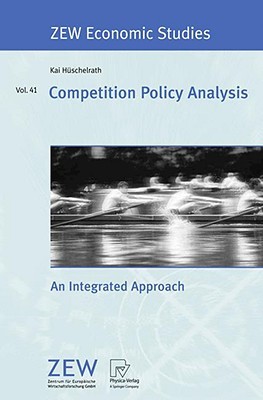
- We will send in 10–14 business days.
- Author: Kai Hüschelrath
- Publisher: Physica Verlag
- Year: 2008
- Pages: 527
- ISBN-10: 379082089X
- ISBN-13: 9783790820898
- Format: 15.5 x 23.6 x 3.1 cm, minkšti viršeliai
- Language: English
- SAVE -10% with code: EXTRA
Reviews
Description
Competition policy is an integral and prominent part of economic policy-making in the European Union. The EU Treaty prescribes its member states to conduct economic policy 'in accordance with the principle of an open market economy with free competition'. More precisely, the goal of EU competition policy is "to defend and develop effective competition in the common market" (European Commission, 2000: 7). Under its Commissioners van Miert, Monti and, most - cently, Kroes the EU Commission has stepped up its effort to pursue and achieve the aforementioned goal. A number of so-called hard-core cartels, such as the - torious "vitamin cartel" led by Roche, have been detected, tried in violation of Art. 81 of the Maastricht Accord and punished with severe fines. Also Microsoft was hit hard by the strong hand of the Commission having been severely fined for - ploiting a dominant market position. Economic analysis has been playing an increasingly significant role in the Commission's examination of competition law cases. This holds true in particular for merger control. Here, however, the Commission has had to accept some poi- ant defeats in court, such as the Court's reversals of Airtours-First Choice or GE- Honeywell. Among other things, the European Court of Justice found the e- nomic analysis as conducted by the EU's Directorate General for Competition to be flawed and the conclusions drawn not to be convincing. These rejections by the courts have stirred up the scholarly debate on the conceptual foundations of Eu- pean competition policy.
EXTRA 10 % discount with code: EXTRA
The promotion ends in 22d.06:40:32
The discount code is valid when purchasing from 10 €. Discounts do not stack.
- Author: Kai Hüschelrath
- Publisher: Physica Verlag
- Year: 2008
- Pages: 527
- ISBN-10: 379082089X
- ISBN-13: 9783790820898
- Format: 15.5 x 23.6 x 3.1 cm, minkšti viršeliai
- Language: English English
Competition policy is an integral and prominent part of economic policy-making in the European Union. The EU Treaty prescribes its member states to conduct economic policy 'in accordance with the principle of an open market economy with free competition'. More precisely, the goal of EU competition policy is "to defend and develop effective competition in the common market" (European Commission, 2000: 7). Under its Commissioners van Miert, Monti and, most - cently, Kroes the EU Commission has stepped up its effort to pursue and achieve the aforementioned goal. A number of so-called hard-core cartels, such as the - torious "vitamin cartel" led by Roche, have been detected, tried in violation of Art. 81 of the Maastricht Accord and punished with severe fines. Also Microsoft was hit hard by the strong hand of the Commission having been severely fined for - ploiting a dominant market position. Economic analysis has been playing an increasingly significant role in the Commission's examination of competition law cases. This holds true in particular for merger control. Here, however, the Commission has had to accept some poi- ant defeats in court, such as the Court's reversals of Airtours-First Choice or GE- Honeywell. Among other things, the European Court of Justice found the e- nomic analysis as conducted by the EU's Directorate General for Competition to be flawed and the conclusions drawn not to be convincing. These rejections by the courts have stirred up the scholarly debate on the conceptual foundations of Eu- pean competition policy.


Reviews